| Listing 1 - 10 of 10 |
Sort by
|
Book
ISBN: 9781107692534 9781107068490 9781107705937 1107692539 1107068495 1316371530 1316365530 1107705932 Year: 2015 Publisher: Cambridge Cambridge University Press
Abstract | Keywords | Export | Availability | Bookmark
 Loading...
Loading...Choose an application
- Reference Manager
- EndNote
- RefWorks (Direct export to RefWorks)
Ockham's razor, the principle of parsimony, states that simpler theories are better than theories that are more complex. It has a history dating back to Aristotle and it plays an important role in current physics, biology, and psychology. The razor also gets used outside of science - in everyday life and in philosophy. This book evaluates the principle and discusses its many applications. Fascinating examples from different domains provide a rich basis for contemplating the principle's promises and perils. It is obvious that simpler theories are beautiful and easy to understand; the hard problem is to figure out why the simplicity of a theory should be relevant to saying what the world is like. In this book, the ABCs of probability theory are succinctly developed and put to work to describe two 'parsimony paradigms' within which this problem can be solved.
Logic --- Ockham, of, William --- Reasoning --- Problem Solving --- Simplicity (Philosophy) --- Philosophy, Medieval --- Guilelmus de Occam, --- Simplicité (philosophie) --- Principe d'économie (philosophie) --- Résolution de problème --- Guillaume d'Ockham, --- Reasoning. --- Problem solving. --- Philosophy, Medieval. --- William, --- Simplicity (Philosophy). --- Résolution de problème. --- Guilelmus de Occam, - ca. 1285-1349 --- Medieval philosophy --- Scholasticism --- Philosophy --- Methodology --- Psychology --- Decision making --- Executive functions (Neuropsychology) --- Argumentation --- Ratiocination --- Reason --- Thought and thinking --- Judgment (Logic) --- Guglielmo, --- Guilelmus, --- Guilhelmus, --- Guillaume, --- Guillelmus, --- Guillermo, --- Occam, --- Occam, Guillaume d', --- Occam, William, --- Occamus, Guilielmus, --- Occhamus, Gulielmus, --- Ockam, Guilhelmus de, --- Ockham, William, --- Okkam, Uilʹi︠a︡m, --- Okkʻam, William, --- Wilhelm, --- William Okkʻam,
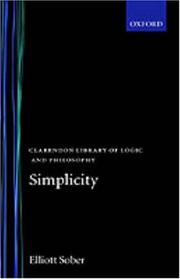
ISBN: 019824407X 9780198244073 0191680729 Year: 1975 Publisher: Oxford Clarendon
Abstract | Keywords | Export | Availability | Bookmark
 Loading...
Loading...Choose an application
- Reference Manager
- EndNote
- RefWorks (Direct export to RefWorks)
Theory of knowledge --- Simplicity (Philosophy) --- Philosophy --- Simplicity (Philosophy). --- Logic --- Simplicity --- Knowledge, Theory of --- Philosophical perspectives
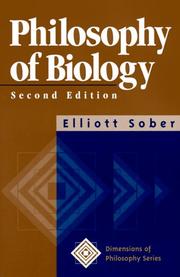
ISBN: 0813391261 9780813391267 Year: 2000 Publisher: Boulder, Colo. Westview
Abstract | Keywords | Export | Availability | Bookmark
 Loading...
Loading...Choose an application
- Reference Manager
- EndNote
- RefWorks (Direct export to RefWorks)
Biology --- Philosophy of science --- Evolution --- Creationism --- Natural selection --- Religion and Science --- Philosophy --- Biologie --- Évolution (biologie) --- Évolutionnisme --- Créationnisme (théologie) --- Sélection naturelle --- Sociobiologie --- Evolution (Biology) --- Creationism. --- Philosophie --- Philosophy. --- Religious aspects --- Christianity. --- Évolutionnisme. --- Sélection naturelle. --- Sociobiologie. --- Philosophie. --- Evolution - Philosophy --- Natural selection - Philosophy --- Acqui 2006 --- Évolution (biologie) --- Évolutionnisme. --- Créationnisme (théologie) --- Sélection naturelle.

ISBN: 0262691620 Year: 1994 Publisher: Cambridge (MA) : M.I.T. Press,
Abstract | Keywords | Export | Availability | Bookmark
 Loading...
Loading...Choose an application
- Reference Manager
- EndNote
- RefWorks (Direct export to RefWorks)
Animal evolution --- Animals--Evolution --- Animaux--Evolution --- Biological evolution --- Biologische evolutie --- Darwinism --- Darwinisme --- Dieren--Evolutie --- Evolutie (Biologie) --- Evolution (Biologie) --- Evolution (Biology) --- Evolution biologique --- Origin of species --- Biology --- Philosophy. --- Evolution (Biology). --- Philosophy
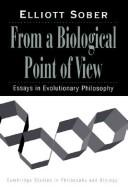
ISBN: 0521477530 0521471842 0511624948 9780521477536 9780511624940 9780521471848 Year: 1994 Publisher: Cambridge Cambridge University press
Abstract | Keywords | Export | Availability | Bookmark
 Loading...
Loading...Choose an application
- Reference Manager
- EndNote
- RefWorks (Direct export to RefWorks)
Elliott Sober is one of the leading philosophers of science and is a former winner of the Lakatos Prize, the major award in the field. This new collection of essays will appeal to a readership that extends well beyond the frontiers of the philosophy of science. Sober shows how ideas in evolutionary biology bear in significant ways on traditional problems in philosophy of mind and language, epistemology, and metaphysics. Amongst the topics addressed are psychological egoism, solipsism, and the interpretation of belief and utterance, empiricism, Ockham's razor, causality, essentialism, and scientific laws. The collection will prove invaluable to a wide range of philosophers, primarily those working in the philosophy of science, the philosophy of mind, and epistemology.
Evolution. --- Biology --- Philosophy of mind. --- Ethics, Evolutionary. --- Knowledge, Theory of. --- Empiricism. --- Essentialism (Philosophy) --- Time. --- Philosophy. --- Essentialism (Philosophy). --- Empiricism --- Ethics, Evolutionary --- Evolution --- Knowledge, Theory of --- Philosophy of mind --- Time --- Ethics, Naturalistic --- Evolutionary ethics --- Naturalistic ethics --- Ethics --- Ethical relativism --- Essence (Philosophy) --- Philosophy --- Substance (Philosophy) --- Experience --- Rationalism --- Vitalism --- Hours (Time) --- Geodetic astronomy --- Nautical astronomy --- Horology --- Mind, Philosophy of --- Mind, Theory of --- Theory of mind --- Cognitive science --- Metaphysics --- Philosophical anthropology --- Epistemology --- Theory of knowledge --- Psychology --- Creation --- Emergence (Philosophy) --- Teleology --- Arts and Humanities
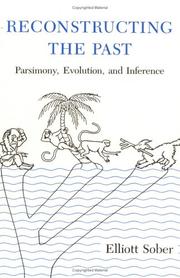
ISBN: 0262691442 9780262691444 Year: 1988 Publisher: Cambridge : The MIT Press,
Abstract | Keywords | Export | Availability | Bookmark
 Loading...
Loading...Choose an application
- Reference Manager
- EndNote
- RefWorks (Direct export to RefWorks)
Evolution (Biologie) --- Biologie --- Philosophie. --- Evolution (Biologie) - Philosophie. --- Biologie - Philosophie.
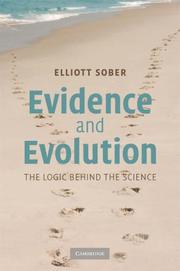
ISBN: 0521871883 0521692741 9780521871884 9780521692748 9780511806285 9780511395048 0511395043 051139439X 9780511394393 0511806280 9780511392399 131609958X 1107180465 1281370770 9786611370770 0511392397 0511391080 0511393687 Year: 2008 Publisher: Cambridge Cambridge university press
Abstract | Keywords | Export | Availability | Bookmark
 Loading...
Loading...Choose an application
- Reference Manager
- EndNote
- RefWorks (Direct export to RefWorks)
How should the concept of evidence be understood? And how does the concept of evidence apply to the controversy about creationism as well as to work in evolutionary biology about natural selection and common ancestry? In this rich and wide-ranging book, Elliott Sober investigates general questions about probability and evidence and shows how the answers he develops to those questions apply to the specifics of evolutionary biology. Drawing on a set of fascinating examples, he analyzes whether claims about intelligent design are untestable; whether they are discredited by the fact that many adaptations are imperfect; how evidence bears on whether present species trace back to common ancestors; how hypotheses about natural selection can be tested, and many other issues. His book will interest all readers who want to understand philosophical questions about evidence and evolution, as they arise both in Darwin's work and in contemporary biological research.
Philosophy of nature --- Logic --- Evolution. Phylogeny --- Evolution (Biology) --- Natural selection --- Evidence --- Probabilities --- Philosophy --- Evidence. --- Philosophy. --- Probability --- Statistical inference --- Proof --- Combinations --- Mathematics --- Chance --- Least squares --- Mathematical statistics --- Risk --- Belief and doubt --- Faith --- Truth --- Arts and Humanities --- Evolution (Biology) - Philosophy --- Natural selection - Philosophy --- Probabilities - Philosophy
Book
ISBN: 1108597637 1108558062 1108643922 1108457428 Year: 2019 Publisher: Cambridge : Cambridge University Press,
Abstract | Keywords | Export | Availability | Bookmark
 Loading...
Loading...Choose an application
- Reference Manager
- EndNote
- RefWorks (Direct export to RefWorks)
This Element analyzes the various forms that design arguments for the existence of God can take, but the main focus is on two such arguments. The first concerns the complex adaptive features that organisms have. Creationists who advance this argument contend that evolution by natural selection cannot be the right explanation. The second design argument - the argument from fine-tuning - begins with the fact that life could not exist in our universe if the constants found in the laws of physics had values that differed more than a little from their actual values. Since probability is the main analytical tool used, the book provides a primer on probability theory.
Theism. --- God --- Religion --- Philosophy --- Atheism --- Misotheism --- Panentheism --- Proof. --- Philosophy.
Book
ISBN: 9781009376037 1009376039 9781009376051 9781009376013 1009376020 1009376047 Year: 2024 Publisher: Cambridge, United Kingdom ; New York, NY Cambridge University Press
Abstract | Keywords | Export | Availability | Bookmark
 Loading...
Loading...Choose an application
- Reference Manager
- EndNote
- RefWorks (Direct export to RefWorks)
Natural selection, mutation, and adaptation are well-known and central topics in Darwin's theory of evolution and in the 20th - and 21st -century theories which grew out of it, but many other important topics are used in evolutionary biology that raise interesting philosophical questions. In this book, Elliott Sober analyses a much larger range of topics, including fitness, altruism, common ancestry, chance, taxonomy, phylogenetic inference, operationalism, reductionism, conventionalism, null hypotheses and default reasoning, instrumentalism versus realism, hypothetico-deductivism, essentialism, falsifiability, the principle of parsimony, the principle of the common cause, causality, determinism versus indeterminism, sensitivity to initial conditions, and the knowability of the past. Sober's clear philosophical analyses of these key concepts, arguments, and methods of inference will be valuable for all readers who want to understand evolutionary biology in both its Darwinian and its contemporary forms.
Evolution (Biology) --- Genetics --- Natural selection --- Probabilities --- Philosophy.
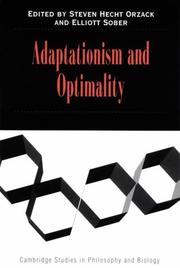
ISBN: 0521598362 052159166X 0511609086 9780521591669 9780521598361 9780511609084 Year: 2001 Publisher: Cambridge Cambridge University press
Abstract | Keywords | Export | Availability | Bookmark
 Loading...
Loading...Choose an application
- Reference Manager
- EndNote
- RefWorks (Direct export to RefWorks)
The debate over the relative importance of natural selection as compared to other forces affecting the evolution of organisms is a long-standing and central controversy in evolutionary biology. The theory of adaptationism argues that natural selection contains sufficient explanatory power in itself to account for all evolution. However, there are differing views about the efficiency of the adaptation model of explanation. If the adaptationism theory is applied, are energy and resources being used to their optimum? This book presents an up-to-date view of this controversy and reflects the dramatic changes in our understanding of evolution that have occurred in the last twenty years. The volume combines contributions from biologists and philosophers, and offers a systematic treatment of foundational, conceptual, and methodological issues surrounding the theory of adaptationism. The essays examine recent developments in topics such as phylogenetic analysis, the theory of optimality and ess models, and methods of testing models.
Evolution. Phylogeny --- Adaptation (Biology) --- Adaptation (Biology). --- Evolution (Biology) --- Environment --- Biology --- Self-organizing systems --- Variation (Biology) --- Biological fitness --- Genetics --- Environmental adaptation --- Adaptation, Environmental --- Arts and Humanities --- Philosophy
| Listing 1 - 10 of 10 |
Sort by
|

 Search
Search Feedback
Feedback About UniCat
About UniCat  Help
Help News
News